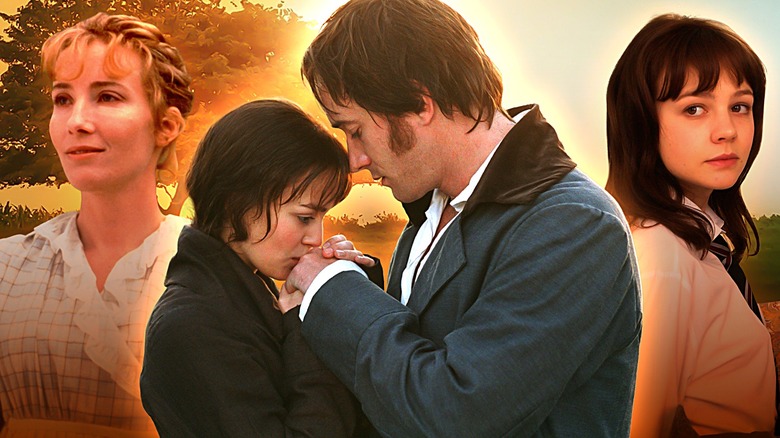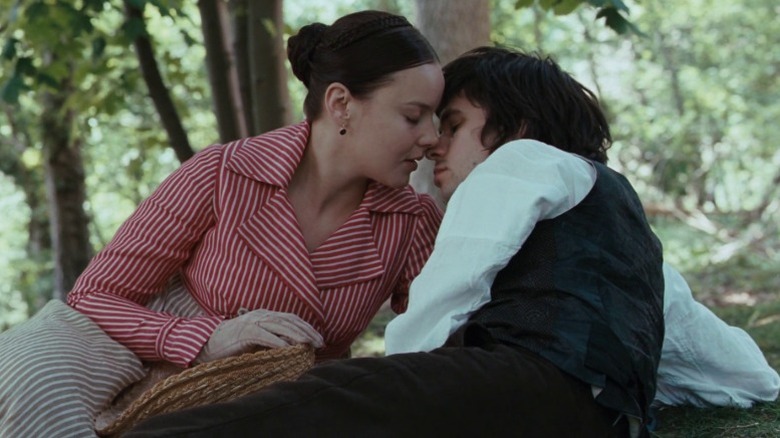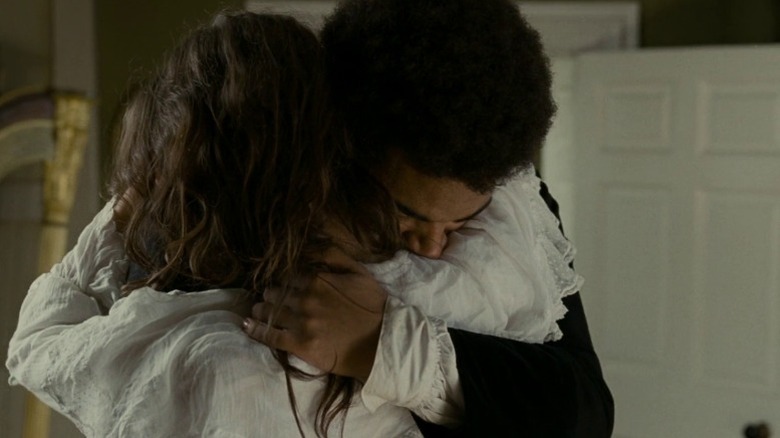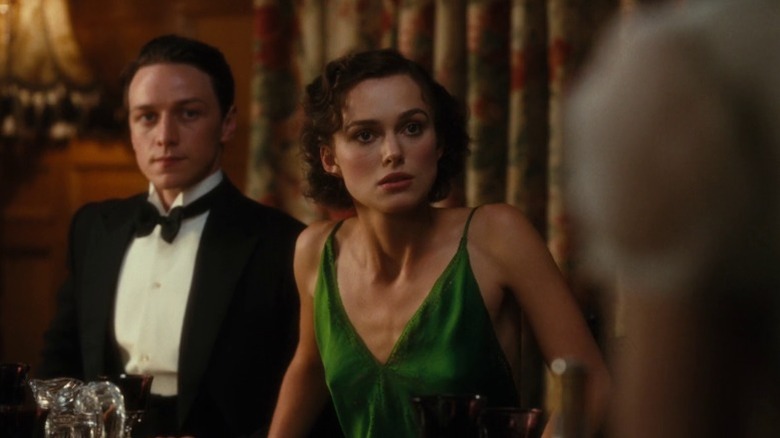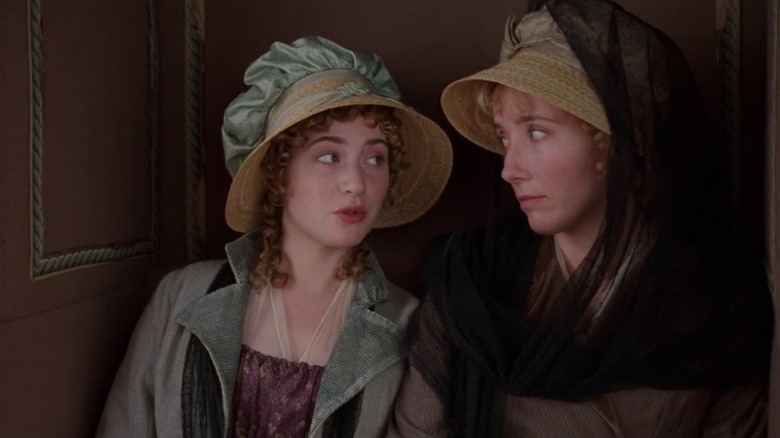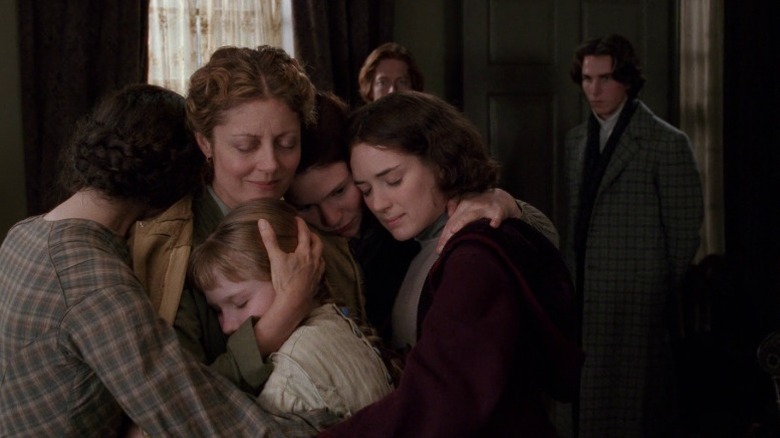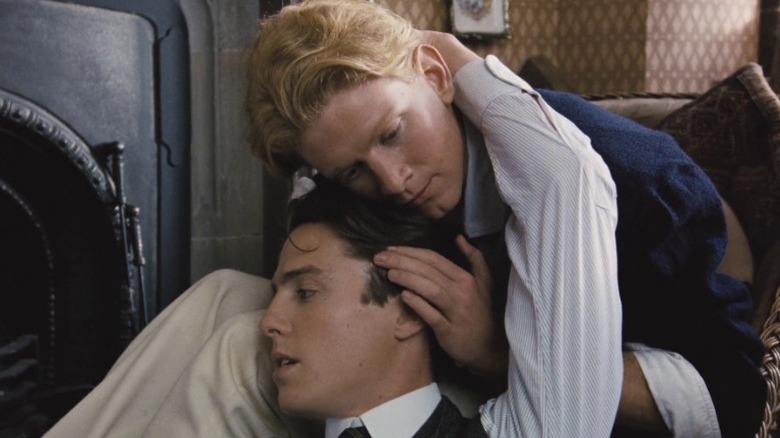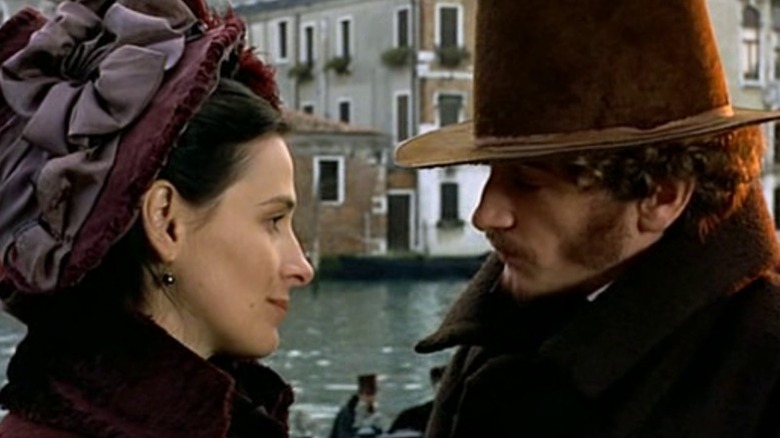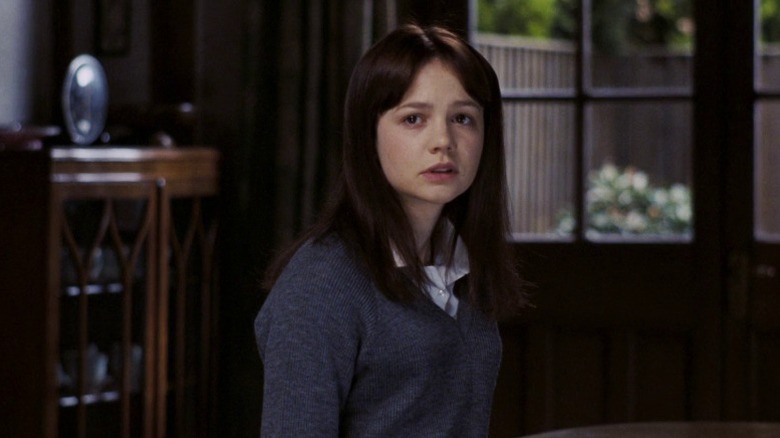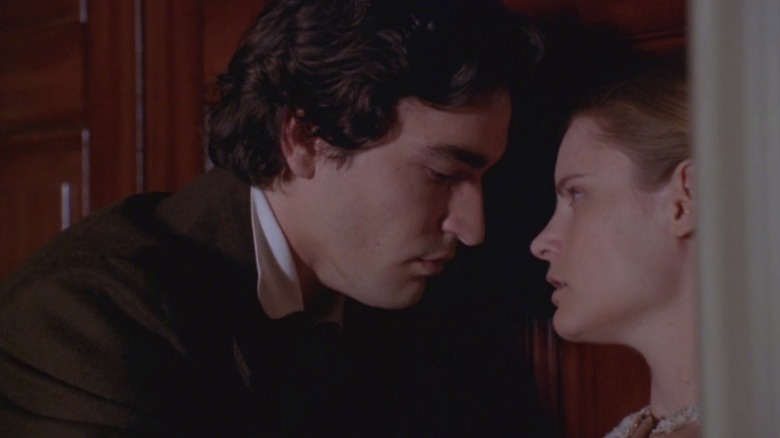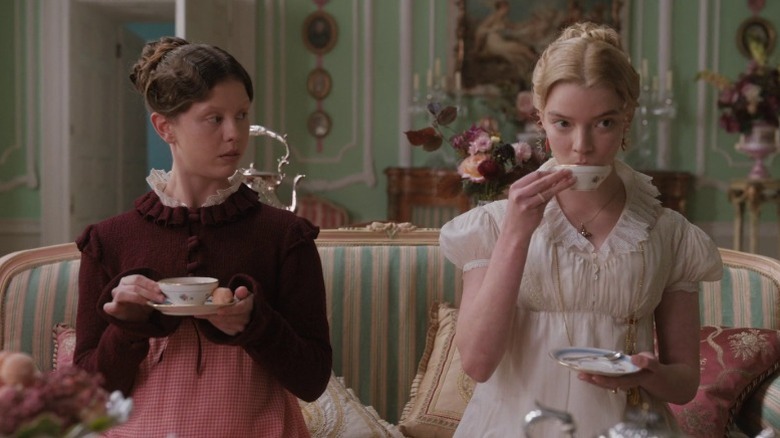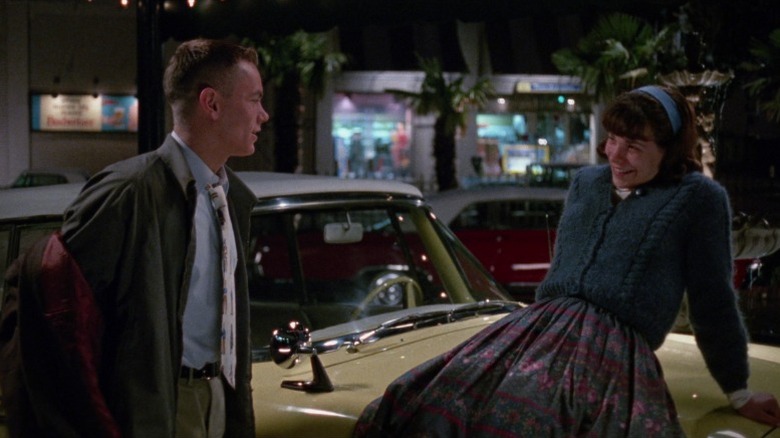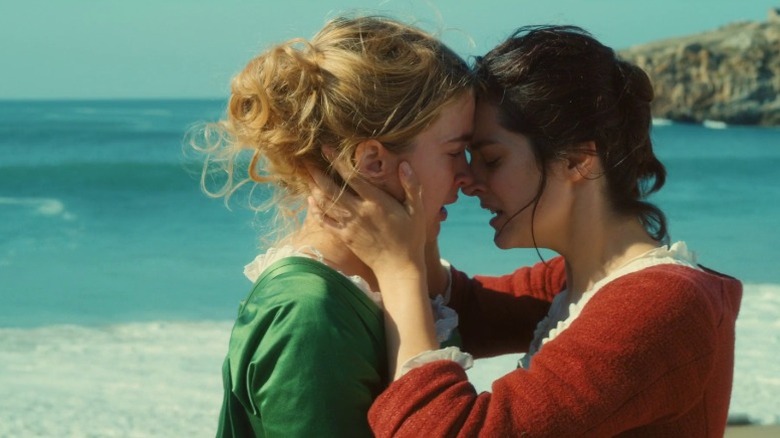12 Movies Like Pride & Prejudice You Need To Watch Next
"Pride and Prejudice" is the kind of novel that feels modern no matter when it's read, but Jane Austen herself died in 1817, more than 70 years removed from the invention of motion pictures. In other words, she probably could never have imagined that, hundreds of years in the future, there would be so many recorded dramatic adaptations of her most celebrated work — nor that one of them, 2005's "Pride & Prejudice," would be able to capture its spirit so brilliantly as to renew passion for the story of Elizabeth Bennet (Keira Knightley) and Mr. Darcy (Matthew Macfadyen) for a whole generation.
Arguably the best Jane Austen adaptation, that Deborah Moggach-scripted, Joe Wright-directed take on the novel was so perfect — so impeccably attentive to the sharp social observation, the warm family dynamic, the richness of local and temporal texture, and the soul-stirring romanticism of the source material — that it interrupted a cycle of decades of periodic screen adaptations of "Pride and Prejudice." Save for looser, unorthodox adaptations like "Fire Island" and "Pride and Prejudice and Zombies," no other film or TV director has dared touch Austen's masterpiece since.
If you count yourself as one of the many ardent fans of Wright's "Pride & Prejudice," but you feel like putting on something new instead of rewatching it for the 100th time (not that there's anything wrong with that), fret not: Here, we've compiled a list of 12 other films like "Pride & Prejuice" that you can watch next.
Bright Star
Jane Campion is one of cinema's most adroit chroniclers of the archeology of love and its secret nooks and crannies. With a filmmaking method that comes down to tenderness, her period films engage in such intimate, unflinching observation of the forms taken on by intimacy and desire in bygone eras that watching them almost feels like becoming privy to new, once-hidden dimensions of human history. On top of that, of course, Campion is a master stylist who knows how to infuse even her darkest and thorniest films with stark, overwhelming beauty. As a result, you could pluck any title from her catalog of costume dramas and it would probably make a great "Pride & Prejudice" companion — but no film would fit that bill more perfectly than "Bright Star."
This 2009 film dramatizes the doomed but deeply loving relationship between trailblazing early-19th-century Romantic poet John Keats (Ben Whishaw) and Fanny Brawne (Abbie Cornish). In locating the physical, sensual, and historical components of their blossoming attraction and emotional entanglement, Campion emphasizes both Keats' aching writing and Brawne's less famous but equally soulful work designing and sewing dresses. Both lovebirds' vehicles of creative expression become canvases for their ardent yet delicate emotions as they surrender to a love made challenging by Keats' poor financial standing and then by his ailing health. It's a gut-wrenching yet swooningly beautiful and immaculately designed period romance, full of little Campion-ian dashes of life and authenticity that make it linger in the mind.
Wuthering Heights (2011)
Much like Jane Austen's "Pride and Prejudice," Emily Brontë's "Wuthering Heights" could be described as a standard of romance literature. Even so, it is not exactly a proper romance novel in the strictest sense. It's appropriate, then, that it was the source material chosen by English maverick filmmaker Andrea Arnold to make a movie that twists and subverts the conventions of the standard period romance film. Arnold's 2011 take on "Wuthering Heights" is not only the best cinematic adaptation of Brontë (sorry, Laurence Olivier), but it's also one of the essential films for anyone who's captivated by the ebb and flow of costume dramas — not least because it adds something wholly unusual and original to that genre.
Dark, somber, moody, and enveloped in gauzy humidity and lurid sensation — like any "Wuthering Heights" adaptation worth its salt should be, yet so few bother — Arnold's film stars James Howson as Heathcliff, the brooding young man who's adopted from the streets of Liverpool into the Earnshaw family on the Yorkshire moorlands, and Kaya Scodelario as his foster sister and eventual lover Catherine. The script focuses on Catherine and Heathcliff's youth and makes some bold deviations from the source material, but regardless of its stricto-sensu narrative faithfulness, the movie — with its trademark Arnold blend of raw handheld shooting and utterly breathtaking visual composition — cuts right to the heart of Gothic fiction as an uneasy yet spellbinding interplay between tenderness and brutality.
Atonement
Before his career veered in the direction of stuffy Oscar bait biopics like "Darkest Hour" and goofy, derivative thrillers like "The Woman in the Window," there was a period of time in which it really looked like Joe Wright might be single-handedly reinventing period dramas for the 21st century. His note-perfect, miraculously fresh "Pride & Prejudice" was an auspicious enough breakthrough, but then came "Atonement," in which Wright once again got everything right that he'd gotten in his previous film — and this time laced it all with a stunning degree of risk and unwieldiness.
Adapted from a brilliant Ian McEwan novel, "Atonement" is a grand tragedy of ravenous yearning against the grain of history. If you're a fan of Keira Knightley's Elizabeth Bennet, you owe it to yourself to see what she does with Cecilia Tallis, an equally complex yet even more tortured character whose love for Robbie Turner (James McAvoy) is faced with even greater moral and societal hurdles; this is arguably the best Keira Knightley movie. Wright captures the stifling horrors of the film's 1930s-40s setting as keenly as he does the youthful brio of Jane Austen's Regency-era England in "Pride & Prejudice," visualizing the novel's chain of disastrous events with a punchy intensity usually reserved for thrillers — with help from 12-year-old Saoirse Ronan giving one of the most incredible child performances in film history.
Sense and Sensibility (1995)
Another great Jane Austen film adaptation with a modern, effervescent feel is the 1995 version of "Sense and Sensibility" — still, to date, the only straightforward theatrical film adaptation of Austen's eponymous 1811 novel. Much like "Pride & Prejudice," "Sense and Sensibility" trains its focus on sisterly relationships in a family of landed gentry, and the tensions between love and financial necessity epitomized in the institution of marriage. But it's even more overt about the class angle, making it the whole crux of the story, which doesn't subtract one bit from either the novel or the movie's romanticism.
In fact, "Sense and Sensibility" is the kind of literary adaptation that gives off the feeling of everybody involved working hard to get everything right. With a script by then-first-timer Emma Thompson and sparkling direction from early-period Ang Lee, the movie takes liberties with the novel yet captures its spirit as best it can be captured. It's impossible to watch it and not be fully enchanted by the dynamic between sisters Elinor (Thompson) and Marianne Dashwood (Kate Winslet), nor by the one between them and their respective suitors Edward Ferrars (Hugh Grant) and Colonel Brandon (Alan Rickman). As the sisters find themselves suddenly impoverished and in urgent need of marriage as a pathway to financial stability, the movie somehow finds ways to translate the brutal realities and complex negotiations demanded by the 19th-century English class system into perfect crowd-pleasing entertainment.
Little Women (1994)
The only real problem with Greta Gerwig's 2019 adaptation of Louisa May Alcott's "Little Women" is that it became so massively popular as to all but eclipse Gillian Armstrong's equally excellent, equally modern-feeling, equally star-studded 1994 version among younger generations. So let this list be your incentive to also seek out the 1994 "Little Women" — not just as an alternative interpretation of the novel but as a perfect introduction to Gillian Armstrong.
Armstrong is, after all, a filmmaker whose work is sure to feel not just appealing but outright foundational for any fan of "Pride & Prejudice." In her movies, such as "My Brilliant Career" and "Mrs. Soffel," she helped codify and consolidate our contemporary understanding of the period drama film and its wide range of potential avenues for beauty, romanticism, and layered humanist storytelling.
"Little Women" is an especially fascinating showcase of Armstrong's talent because, out of all her films in the genre, it is arguably the simplest and least showy, yet also the most affecting, crafting a cozy sisterly nest that seems almost too lived-in and affectionate to be true. And the cast — starring Winona Ryder, Trini Alvarado, Kirsten Dunst, and Claire Danes as the March girls, Susan Sarandon as their mother, and Gabriel Byrne and Christian Bale as Friedrich and Laurie — is utter perfection.
Maurice
The blueprint for all contemporary period romance films was laid out by James Ivory and Ismail Merchant in the sumptuous, sparkling films of Merchant Ivory Productions. In works like "The Bostonians," "Howards End," "A Room with a View," and "Remains of the Day," the life-and-business-parter team of Ivory (who mostly directed) and Merchant (who mostly produced) set the bar for what the movie world thought of when it thought of impassioned dalliances in lush period garments. 1987's "Maurice," in addition to being one of their most definitional films, also has the distinction of being a Merchant Ivory film that tells explicitly of gay love.
Directed by Ivory and adapted from E. M. Forster like a great many of the studio's films — yet exceptionally not written by screenwriting legend Ruth Prawer Jhabvala, who was writing a novel at the time — "Maurice" is a queer bildungsroman following the life and times of Maurice Hall (James Wilby). A gay man living in early-20th-century England, Maurice does his best to move through the repressive throes of Edwardian society, and in the process strikes up troubled yet tender relationships with Clive Durham (Hugh Grant) and Alec Scudder (Rupert Graves). One of the most influential LGBTQ+ movies ever made, "Maurice" is a gorgeous, heartrending movie that teems with the tactile details, sharp period observations, and subtle infusions of deep feeling which became Ivory's trademark as a filmmaker.
The Children of the Century
If you like your period romances a little more on the tempestuous and tragic side, "The Children of the Century" is just the movie for you. This 1999 French film hews to a vintage Romantic depiction of love as both a restorative and destructive force; there's a case to be made for it as the most intense and deeply-felt of all the various historical dramas that Juliette Binoche headlined in the 1990s and 2000s.
Helmed by the vastly underrated Diane Kurys, with an original screenplay written by Kurys herself alongside Murray Head and François-Olivier Rousseau, "The Children of the Century" finds its director rendering 19th-century France with a level of sensory splendor and density that gets to be overwhelming as it interfaces with the torrid emotions of the love affair between novelist George Sand (Binoche) and poet Alfred de Musset (Benoît Magimel). Partly rooted in fact — Sand and Musset really did have an affair between 1833 and 1835 — the film locks into an almost claustrophobic view of its two protagonists as they circle each other helplessly in a dance both toxic and intoxicating, causing myriad forms of mutual hurt yet unable to stay apart.
An Education
Few cinematic depictions of the process of stepping into adulthood and shaping oneself into its contours have ever been more honest, complex, and sensitively-observed than Lone Scherfig's "An Education." A critical sensation and sizable box office success that nabbed an Oscar nomination for Best Picture as well as additional nods for Nick Hornby's screenplay and for Carey Mulligan in her breakthrough performance, this 2009 film is set in the 1960s, more than a whole century after the Regency milieu of "Pride & Prejudice," in which Mulligan made her screen debut as Kitty Bennet. Yet the spirit of Austen's fascination with bright, free-spirited young women and their chosen methods of navigating English society is very much alive in it.
The plot, adapted from the eponymous memoir by Lynn Barber, follows one Jenny Mellor (Mulligan) from London, a diligent and smart 16-year-old girl with dreams of attending Oxford who struggles to find a space for her wants and needs under the wing of her ultra-strict father Jack (Alfred Molina). One day, she meets the dashing older David Goldman (Peter Sarsgaard) by chance, and the two begin a relationship that seems blissful and liberating to Jenny at first, yet will wind up teaching her all about the ugly realities of men, heartbreak, and life as an adult woman. It's an exhilarating movie made up of quiet moments of tension, hurt, and resolve; by the time the credits roll, you will find yourself feeling for Jenny as though for yourself.
Washington Square
Polish filmmaker Agnieszka Holland is among the most important and most versatile auteurs to have emerged from the European arthouse scene in the 1980s. Over the decades, she's proven herself equally capable of giving full cinematic throttle to a whimsical kids' fantasy film like "The Secret Garden," a brutal Holocaust drama like "Europa Europa," or a courageous refugee crisis exposé like this year's much-renowned "Green Border." And, in 1997, she also showed that she could get a straightforward costume drama down pat with the Henry James adaptation "Washington Square."
"Straightforward" may be pushing it a bit, actually, given that James presses down even harder than Austen on the theme of matrimony as financial management. Based on the eponymous 1880 novel, "Washington Square" is a shrewd, off-the-cuff romance that poses a rattling what-if: Would you give yourself over to love if you knew for a fact that you're only being courted for your money? Such is the dilemma faced by Catherine Sloper (Jennifer Jason Leigh), a rich, introverted heiress living in 19th-century New York City, when she's swept off her feet by an outpouring of attention and affection from the younger and broke Morris Townsend (Ben Chaplin). Caught between the opposing wills of her father Austin (Albert Finney), who clocks Townsend immediately and forbids the romance, and her aunt Lavinia (Maggie Smith), who enthusiastically encourages it, the lovestruck Catherine must find her own way out of a question with no easy answers.
Emma. (2020)
What doesn't get said often enough about Jane Austen is that she was an extremely funny writer. The background of dry, clear-eyed pragmatism that often informed her inventories of English social life tipped over into outright satire — and vicious, boisterous satire at that — much more frequently than the cultural clichés about her work would suggest, and her penchant for fine-grained human observation allowed her to find plenty of humor in even the smallest gestures and interactions. Fittingly enough, several film adaptations of Austen have gravitated heavily towards comedy over the years. Among those, Autumn de Wilde's "Emma." is notable for being maybe the best, most balanced cinematic blend of Austen the jester and Austen the romantic.
The feature film debut of de Wilde, who made her name in celebrity photography and music video direction, "Emma." is so painstakingly gorgeous and aesthetically imaginative that it almost hurts — you'll have trouble finding another period film with this much delectable color and balletic composition. The story of Austen's least lovable heroine Emma Woodhouse (Anya Taylor-Joy), a high-society Regency woman who favors matchmaking as a hobby and endlessly meddles in the love lives of everybody around her just for the fun of it, is the perfect campground for de Wilde and screenwriter Eleanor Catton to bring Austen's astute social and emotional insights to fruition with inexhaustible sense of humor, while still leaving room for honest-to-goodness love to do its thing.
Dogfight
There's just something about the 1960s — the lush decadence, the simultaneous repression and liberation, the turmoil of social progressivism coming up against reactionary resistance, the cosmopolitan modernity still tied up in old ways, the contradictions imposed upon women — that's fascinatingly evocative of the 19th century chronicled by Jane Austen. "An Education" demonstrates as much, and so does "Dogfight," a movie in which American director Nancy Savoca looks for the empathy and the sentiment in an untenable romantic scenario.
It's November 21, 1963, the day before President John F. Kennedy's assassination, and 18-year-old Marine Eddie Birdlace (River Phoenix) is using his one-day San Francisco leave to join his colleagues in a misogynistic ritual known as a "dogfight"–— a contest in which the boys must bring over the ugliest date they can find. Eddie asks out shy cafe waitress Rose Fenny (Lili Taylor), only to be consumed with guilt about the whole enterprise as Rose begins to genuinely charm him. The stage is thus set for a fraught, devastating, yet dizzyingly gorgeous 24-hour romance drenched in vivid period detail, with two incredible actors fully inhabiting a pair of troubled, complicated, painfully human characters.
Portrait of a Lady on Fire
With "Portrait of a Lady on Fire," Céline Sciamma set out to do nothing less than reinvent the romance film out of whole cloth. Talk about lofty ambition, yes, but even more impressively, she actually succeeded. Her reinvention of the visual and aural language by which two people are shown slowly falling in love was arguably the most momentous event in the romance genre since Wong Kar-wai's "In the Mood for Love" in 2000.
The setup alone is genius: 18th-century painter Marianne (Noémie Merlant) is hired to paint a portrait of young gentry woman Héloïse (Adèle Haenel) in order to facilitate her arranged marriage to a nobleman. Héloïse does not want to be married and does not want to be painted, but Marianne has a job to do. Alone on a remote island, constantly locking eyes and observing each other's tiniest movements, the two women begin to grow closer, and they end up inventing a whole miniature universe made up only of their own gestures and thoughts and feelings and deep-seated desires. In her quest, Sciamma deconstructs and reconstructs it all: the courtship, the interest, the communication, the touches, the eroticism, the gaze of the camera, the pressures of the time and place, until love emerges as a force of elemental purity.
